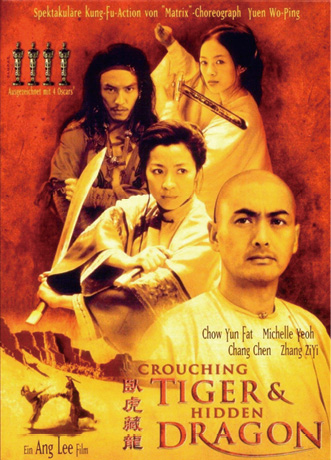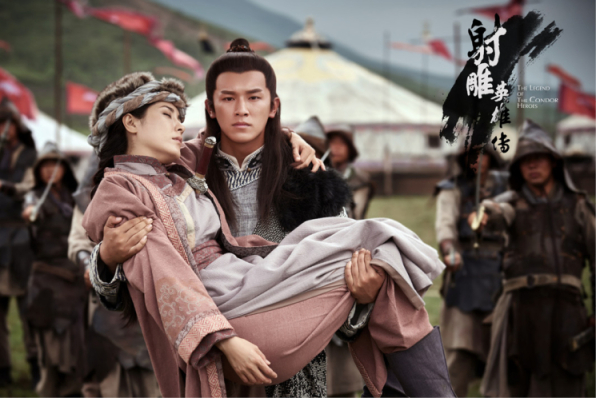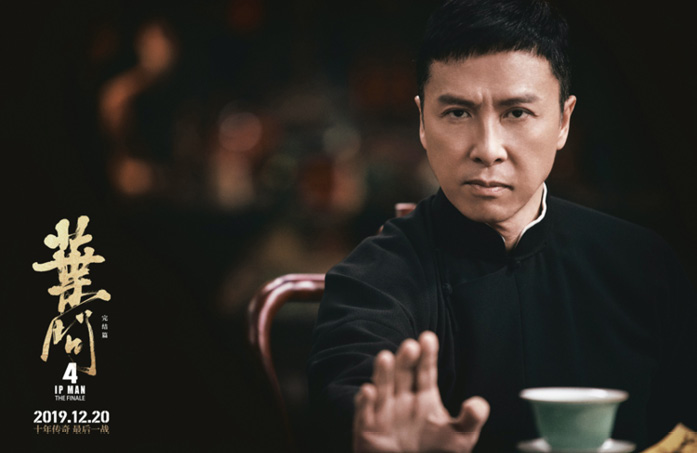The Charm of China Martial Arts
As an important type of TV series, martial arts drama has always been an "evergreen tree" in China TV field. The chivalrous spirit of "the greatest chivalrous man is for the country and the people" makes people not forget about martial arts dramas, but also shows the charm of China’s martial arts to the world.

In Crouching Tiger, Hidden Dragon, Ang Lee completed the poetic aesthetic expression of Chinese style with the lens.
Martial arts works in time memory
In 1950s and 1960s, with the popularity of new martial arts novelists such as Jin Yong, Gu Long and Liang Yusheng, the martial arts stories, which mainly describe the chivalrous behaviors and fate feelings of martial arts characters, and express the martial arts actions and the pleasure and enmity behaviors of Jianghu children, gradually moved to the film and television stage from writing creation. China’s martial arts dramas began to enter a glorious period in the 1980s. In 1982, Xu Shaoqiang, Tang Zhenye and Felix Wong Yat Wa created Xiao Feng, Duan Yu and Xu Zhu in "Eight Dragons", which became the martial arts idols of a generation of audiences. This martial arts drama directly influenced the creation of martial arts dramas in the future and the aesthetic psychology of the audience. Guo Jing, played by actor Felix Wong Yat Wa in The Legend of the Condor Heroes, which was put on the TV screen by Hong Kong TVB in 1983, is a man of great wisdom, patriotic, filial piety and affection, which largely restored the image of "hero" in Jin Yong’s original works. The other actors in the play also restored the original characters to a remarkable degree, which left a deep impression on the audience. In the same year, The Condor Heroes, which was adapted from the novel of the same name, is regarded as the pinnacle of Jin Yong’s drama.
In the 1990s, although the martial arts dramas in Hong Kong were not as beautiful as before, a large number of classic martial arts movies were born under the impetus of the martial arts dramas. For example, Hu Jinquan’s the legendary swordsman, He Ping’s Knights in Shuangqi Town, Wong Kar-wai’s ashes of time, Tsui Hark’s Ghost Story, Huang Feihong series and Xinlongmen Inn all tell the love and hate in the martial arts world with different aesthetic ideas and characters, and show China’s chivalrous culture with audio-visual symbols. Tsui Hark, represented by "New Martial Arts Movies", successfully created a national hero image of helping the weak and helping the poor and upholding justice for the people in his "Huang Feihong" series, revealing the organic connection between personal destiny and the destiny of the times. At the same time, the martial arts dramas in the mainland have sprung up everywhere, and there have emerged martial arts works such as "The Life and Hatred of the Jianghu", "The Legend of the Hawker B" and "Tai Chi Master".
Since the 21st century, the core and extension of martial arts film and television dramas have been constantly enriched and expanded. As a kind of plot type that China audiences have long been familiar with and loved, film and television creators have never given up their cultivation in the field of martial arts themes. In addition to the legendary swordsman (2001), Little Fish and Hua Wuque (2005), Flying Fox of Snowy Mountain (2007) and Dragon Slayer (2009), Eight Dragons, which ended in CCTV-8 and Tencent in 2021, brought the long-lost martial arts TV series into public view and aroused many viewers’ awareness of their own martial arts TV dramas of that era. The drama supplements the story of Qiao Feng, the protagonist, becoming the leader of the Beggars’ Sect and leading the crowd to fight against Liao, laying the foundation for the image of Qiao Feng in the original work, which is fearless of adversity, full of lofty sentiments and sadness, and "knowing what it is impossible to do". The characters are real and natural, so that the drama can avoid the simple violent filling or the deviation from the main line of curiosity, and concentrate more on interpreting the real "martial arts spirit".
In terms of martial arts movies, Ang Lee used the lens to express Chinese poetic aesthetics in Crouching Tiger, Hidden Dragon, Zhang Yimou used Hero to express the value orientation of putting the overall situation of the world first, Wong Kar-wai used A Generation of Masters to express compassion, and Ye Weixin’s "Ip Man" series not only showed the audience the beauty of Wing Chun Boxing with softness and rigidity, but also paid more attention to carefully depicting and showing the ideological growth experience of the protagonist IP Man from the family life level, thus shaping a novel.
Although martial arts film and television works are no longer so popular in the current film and television market, film and television creators have completed the story writing of "Xia" with their own works, completed the emotional exploration of "Xia", expressed their thoughts on the spirit of "Xia", and brought many memorable classic martial arts works to the audience.

The heroic atlas displayed in The Legend of the Condor Heroes transcends the general sense of chivalry, and is full of love for the people and care for the people in the world.
Return to traditional martial arts culture
As a unique culture in China, the China cultural elements and aesthetic features presented in martial arts stories, as well as the heroic image and literati ideal represented by chivalrous men, have influenced generations of Chinese. In particular, Mr. Jin Yong’s works have accompanied generations to grow up. The martial arts world portrayed in his works and the martial arts spirit created are precious spiritual wealth left to the Chinese people and have become the national martial arts culture gene.
Martial arts dramas adapted from martial arts novels not only have the function of entertaining the public, but also shoulder the cultural responsibility. However, since the new century, under the impetus of capital, the traditional martial arts culture has gradually disappeared because of the blind pursuit of fast film and television production and even the blind pursuit of visual stimulation. Faced with this situation, in recent years, many creators have made constant efforts to return to the traditional martial arts culture.
For example, nirvana in fire, which was broadcast in 2015, has received rave reviews since it was broadcast. In addition to the vivid and wonderful story and polished shooting details, it is even more exciting that justice will eventually dispel the dark belief, and you should be concerned about the connotation of the whole world whether you live in the temple or in the rivers and lakes.
The remake of The Legend of the Condor Heroes in 2017 not only restores the original content, but also shows the ultimate "orthodox martial arts style" effect from the exquisiteness and lofty sentiments of the martial arts painting style to the ups and downs of the plot, showing concern for the sufferings of the people in troubled times, whipping corrupt officials in the four wars and eulogizing the heroes who died. The map of heroes displayed in it transcends the chivalry in the general sense, and is full of love for the people and care for the people in the world.
The 2021 edition of "Dragon’s Eight Branches" not only presents the great sense of family and country in the original work, but also depicts the good and evil of human nature, and discusses the fate of the characters who "seek but can’t".
The martial arts drama series represented by the film and television drama "Eight Dragons" are all closely related to the chivalrous spirit. In the social environment where wars are incessant, chaos is heavy, and people are suffering from hardships, chivalrous people pursue not only the pleasure of walking in the rivers and lakes, but also the ambition of helping the world. This is the charm of martial arts culture, which is also the initial intention of many film and television creators to constantly explore and practice martial arts film and television works.

The series "Ip Man" has created a national hero image that cares about family, values family ties, knows national justice and is willing to take responsibility.
"Chivalrous spirit" goes to the world
The martial arts world is full of love and hate, and these feelings are the common emotional needs of human beings. Stories in the world of martial arts are just like real things that happen around us. The core spirit of chivalry in martial arts dramas, which emphasizes the national spirit of "striving for self-improvement", "respecting morality and carrying things" and the martial arts spirit of "being brave" and "eliminating evil and promoting good", not only has a broad pattern and is more grounded, but also lays a good foundation for domestic martial arts dramas to go overseas.
As early as 2005, Jin Yong’s martial arts films, such as The Legend of the Condor Heroes, Eight Dragons, and The Condor Heroes directed by Zhang Jizhong, were broadcast on NECO pay TV in Japan one after another, and genuine DVDs were released, thus a large number of China martial arts fans came into being, and Japanese audiences were full of praise for China’s martial arts dramas.
In 2013, IP Man, a TV series with positive energy such as blood, patriotism and inspiration, was based on the growth experience of a generation of grandmaster IP Man. After being purchased by Hong Kong TVB Group for overseas broadcasting rights, it launched a global simulcast, which was broadcast on Star Hub Entertainment Theatre in Singapore, Astro Gorgeous Television in Malaysia, European TVB overseas channels (Britain, France, Netherlands, etc.), American TVB overseas channels, Canadian City TV, and TVBJ Emerald in Australia.
In 2015, when "nirvana in fire" was broadcast on South Korea’s China Television Station, it ushered in a viewing frenzy in South Korea, setting a record for that year. In terms of martial arts films, Ang Lee’s Crouching Tiger, Hidden Dragon won the Academy Award, and Zhang Yimou’s Hero was nominated for the Oscar for best foreign language film, which won a lot of box office in overseas markets. It can be seen that martial arts film and television works, as an important media to express China culture and China style, provide fresh and unique cultural and aesthetic experiences for overseas audiences, and also enhance the creators’ confidence in "going out".
Looking at these martial arts film and television works, which are widely praised overseas, all inherit the martial arts spirit extracted from martial arts culture by Mr. Jin Yong. These martial arts film and television works contain values and humanistic feelings such as responsibility for family, country, society and even human beings, abiding by justice, pursuing freedom and being brave in sacrifice, which are in line with the common value orientation and emotional needs of human beings and are an important foundation for martial arts culture to go global.
Nowadays, it is a new task for every film and television creator to make full use of the film and television media, tell the story of China’s chivalry, show the beauty of China’s chivalry, portray China’s image of chivalry, and spread China’s confidence in chivalry, so as to make the film and television drama with the spirit of "being a chivalrous man and serving the country and the people" into a cultural symbol to tell the story of China well.
Liuyicun China Communication University Drama Film and Television College
Niu Mengdi, reporter of Guangming Daily Literature and Art Department